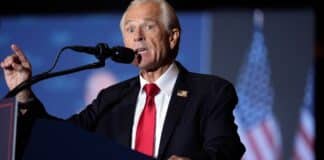In a recent Thursday morning conversation, Former President Donald Trump voiced his opinion that individuals who engage in the act of burning the American flag ought to be penalized with a one-year imprisonment.
This statement was made during his talk on “Fox & Friends,” following an event where anti-Israel demonstrators set the American flag ablaze in Washington, D.C., coinciding with Israeli Prime Minister Benjamin Netanyahu’s address to Congress.
Trump expressed his concern over such acts saying, “We’ve rarely encountered such behavior. Anyone found desecrating the American flag should, in my opinion, receive a one-year jail sentence. There will be those who argue this is unconstitutional, but I believe such views are misguided.”
He further emphasized the need for legislative action to enforce this penalty, attributing the lack of respect shown to the flag as damaging to the country’s image internationally. Trump remarked, “The world is watching us, including leaders like Putin, President Xi, and Kim Jong Un, and our tolerance for such disrespect only serves to undermine our stance globally.”
The protest at Union Station, which took place the day before Trump’s comments, saw anti-Israel protesters clashing with police, vocalizing support for Palestine and displaying symbols associated with Hamas. In light of these events, Republican Senator Tom Cotton has proposed legislation aimed at expelling foreigners who engage in violent protests or vandalism on federal property.
Regarding the legality of flag burning, it is recognized as a form of protected free speech. A notable case was that of Gregory Lee Johnson, whose conviction for burning the American flag in protest was overturned, establishing the act as protected under the First Amendment. This decision, Johnson v. Texas (1989), was confirmed by a Supreme Court ruling, with notable justices across the ideological spectrum supporting the majority opinion.
Justice Antonin Scalia, despite his personal disdain for flag burning, acknowledged the constitutional protection of such acts, highlighting the precedence of free speech rights over personal preferences.





